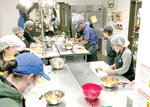

Lansing bars will welcome new faces to the frontlines thanks to a zero-barrier, eight-week training program designed to equip industry workers with the skills and tools needed to be self-sufficient.
Several professional bartenders and culinary chefs are giving free courses on back-of-bar basics, mixology, banquet bartending and culinary 101 to industry workers in New York, Detroit and now Lansing. The umbrella group responsible for the classes is nonprofit Restaurant Opportunities Centers United, formed in New York by 9/11 survivors. The Michigan chapter celebrated its 200th student of the year and its first graduating class in Lansing earlier this week.
Six hundred restaurants opened up in Detroit just this past year and there aren’t enough bartenders, servers, cooks or workers in the back of the house to staff them, according to Pete Vargas, the organizing director of the Michigan chapter. He said the shortage is nationwide, not just in Michigan.
Vargas added that the majority of graduates from Lansing were women of color, a demographic that makes up “over 70% of the food industry.”
“It’s not a first job anymore,” Vargas said. “If you’re working at McDonald’s you might not have any experience knowing what a Merlot is versus a Cabernet. After this class they will have another credential under their belt to maybe work an upscale dining restaurant here in Lansing.”
The free training courses were adopted from Colors restaurant in New York, formed by partners of ROC United. The restaurant has four locations in the United States and started CHOW University, which stands for Colors Hospitality Opportunity for Workers.
Vargas was also a key player in ROC United’s employer association, Restaurants Advancing Industry Standards in Employment. The syndicate of over 1,000 partners pushes for livable wages and working conditions. In Michigan, 240 businesses have joined hands with the national labor force, Vargas said. Local partners include the Allen Neighborhood Center, Ruckus Ramen and Tannin, to name a few.
ROC United has worked to identify the strengths and weaknesses of employers and employees over 17 years of research. The most pressing issues restaurant workers have faced during this period were racial and gender discrimination and financial insecurity.
In 2014, ROC United and four independent state chapters, including Michigan, released a report entitled “The Great Service Divide: Occupational Segregation and Inequality in the US Restaurant Industry,” which analyzed the policies of 273 fine-dining establishments.
The study suggests that women workers pay a “gender tax,” earning 11% less than a man with the same qualifications. For workers of color, the “tax” rises to 56%. Non-naturalized immigrants pay a 57% “tax.”
After coming to these conclusions, the national organization used the data as evidence of the need for affordable bartending classes, as well as support for their One Fair Wage campaign.
The restaurant industry is one of the lowest-paying employers in America, according to 24/7 Wall Street.com. The core of the One Fair Wage campaign is to eliminate the subminimum wage for those who work for tips.
“What we realized in the seven states where they don’t have that two-tier system is they experience less than half of the sexual harassment in the workplace because they don’t have to put up with ‘the customer’s always right,’” Vargas explained.
In the wake of the MeToo movement, ROC United was asked by national gender equity groups, such as NOW, to join efforts in fighting the two-tier system. The result was a half million Michiganians signing a petition to be able to vote on abolishing subminimum wage and phase in a regular minimum wage over the course of six years.
“It won by popularity but because of Republicans, the influence of the National Restaurant Association and the Chamber of Commerce, they influenced the legislators to adopt the new legislation, amend it and gut it during lame duck session. They did it to us and they did it to earn paid sick time,” Vargas said.
In Michigan, overturning a ballot referendum once it is approved requires a three-fourths majority of legislature. Now, the organization is waiting to hear back from litigation at the Supreme Court on the constitutionality of state lawmakers thwarting the bill from getting on the ballot.
While ROC United is not new to the steps of the state Capitol building, its recent investment with aspiring and current restaurant workers has garnered new fans, said Vargas.
“We’re excited to be here in Lansing,” he added. “There has been an outpour of support from folks in the program, but also folks hearing about it for the first time and we will continue to build on that support.”
According to Vargas, the second session of service training classes will begin mid-January. Those interested in signing up can do so at rocmichigan.org.
Support City Pulse - Donate Today!
Other items that may interest you

Comments
No comments on this item Please log in to comment by clicking here